Timothy Noah
Fri, September 1, 2023
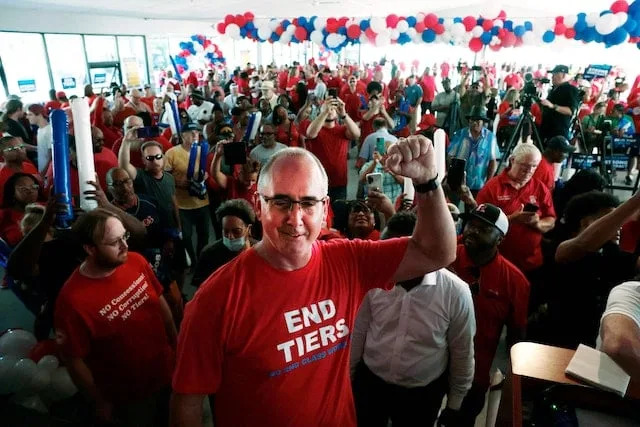
Labor Day may be September 4, but it will remain summer, and therefore Hot Labor Summer, until the September 23 autumnal equinox, by which time the United Auto Workers (UAW) may be on strike. UAW workers last week voted overwhelmingly to authorize strikes at Ford, GM, and Stellantis (the Big Three auto manufacturer formerly known as Fiat Chrysler), and if negotiators don’t agree on a contract by September 14, says UAW President Shawn Fain, 150,000 workers will walk off the job.
Born into a union family—three of his grandparents were auto workers represented by the UAW—Fain started as an electrician for Chrysler in Kokomo, Indiana. He held a variety of positions in UAW’s Kokomo local where, according to his official UAW biography, he was often “ostracized for speaking up,” then moved up to the international union. Fain was elected UAW president in March, in an upset victory over incumbent Ray Curry, after pledging to clean up and re-invigorate the scandal-plagued union, which sent two former presidents to prison for embezzlement. Fain is the first UAW president ever to be elected directly by the rank and file instead of by convention delegates, a procedural change initiated by a 2021 consent decree with the Justice Department to resolve the corruption scandal. I caught up with Fain by phone Wednesday as he was en route to Lansing, Michigan, to attend a speech by Gov. Gretchen Whitmer.
I began by asking how negotiations were going. Slowly, Fain answered. “We’ve given our demands up front,” he said. Management’s strategy, Fain said, is to “slow walk everything,” much as they’ve done in the past under similar circumstances.
When Fain, in early August, outlined the UAW’s contract demands for the Big Three, he called them “audacious.” They live up to that billing. The UAW seeks a 40 percent pay hike over four years, a 32-hour work week at full pay, the elimination of a two-tier wage structure initiated during the Great Recession as GM and Chrysler were going bust, and restoration of defined-benefit pensions for new hires that the UAW gave up in 2008 to help secure the Obama administration’s auto company bailout.
“We have a tradition in this union of aiming low and settling lower,” Fain said. “We have to get away from that.”
The 40 percent increase, Fain said, would catch up workers, after inflation, to what they were making in 2007. And anyway, he said, CEO pay at the Big Three rose 40 percent over the current four-year contract. (That’s about right, according to the Detroit News; GM’s Mary Barra is up 34 percent since 2019.) Fain won’t get UAW workers 40 percent, but it’s a defensible (if audacious) negotiating position.
The 32-hour week? “If Covid taught us anything, it’s that our time is very valuable,” he said. Why should it be OK for white collar workers to cut back hours by working at home, he said, but “obscene” when auto workers demand shorter hours?
The two-tiered wage structure? Variations have existed since the 1980s, when domestic auto manufacturers were rapidly losing ground to foreign manufacturers. Why eliminate them now? Because they’re divisive, Fain said, and anyway, UPS recently got rid of theirs.
Defined-benefit pensions? Aren’t generous pensions a thing of the past? Not for Big Three executives, Fain said. (See my May TNR article on special “top hat plans”—that’s actually what they’re called—available exclusively to corporate big shots.) Fain reminded me that in 1949 former UAW president Walter Reuther (“the most underappreciated American in American history”) secured defined-benefit pensions for retired auto workers with the slogan “too old to work, too young to die.” That hasn’t changed.
I asked Fain about reports that the UAW is withholding its expected endorsement of President Joe Biden, with whom Fain met in July. “It was a good meeting,” Fain said, but “we’ve made it clear that our endorsements are going to be earned, not freely given.” The Biden administration, which issued a report earlier this week touting the benefits of union representation (“Labor Unions and the Middle Class”), dodged a bullet during the past year averting threatened strikes by rail unions, west coast port workers, and United Parcel Service (UPS) drivers. It could use an autoworkers’ strike like a hole in the head.
The Inflation Reduction Act introduced tax credits that prompted, by the end of 2022, a $73 billion investment in United States plants to manufacture batteries for electric vehicles. The Big Three are forming partnerships with other companies to build batteries, and they’ve signaled they’re willing to hire union labor. But Fain says that’s not enough. “The battery work, specifically, that’s the future power train of the automobile,” he said. That power train right now is built by workers covered by the UAW contract. Its replacement, he said, should be built by workers covered by the same contract. “We stand to lose 20 percent of our workers” to battery production, Fain said. “It has to be a just transition.”
I asked Fain more broadly about how to revive the union movement. This Labor Day unions are more popular with the public than they’ve been in 60 years, and strike activity is way up, but the proportion of private-sector workers who belong to a union has fallen to an objectively dismal 6 percent. Fain didn’t try to explain that away, as some labor leaders do. When I asked him about the NLRB’s Cemex decision last week, which will make it easier to organize workplaces through the informal collection of union authorization cards (“card check), he said it’s a “good start.” But “the Democratic Party has to get back to its roots,” he said. He meant its working-class roots. Still, Fain is optimistic. “There can be a great revitalization of labor,” he told me. If there is, I predict Fain will play a big part in the transformation.
Jamie L. LaReau,
Thu, August 31, 2023
The UAW has filed unfair labor practice charges against General Motors and Stellantis for "an illegal refusal to bargain in good faith” during ongoing contract negotiations, union President Shawn Fain announced Thursday night.
The news "shocked" Stellantis, which said it will "vigorously defend" itself against the charge. GM also was "surprised" and said it will strongly refute the charge.
Meanwhile, Fain told viewers of his online livestream that Ford Motor Co. responded to the union's demands, but fell short of what he considers to be a fair contract. The union asked for a 40% hourly wage increase and a return of a cost-of-living adjustment (COLA). Fain said Ford offered a 9% general wage increase over the life of the contract and instead of COLA, a one-time lump sum bonus. He then showed a trash can with the Ford proposal tossed into it.
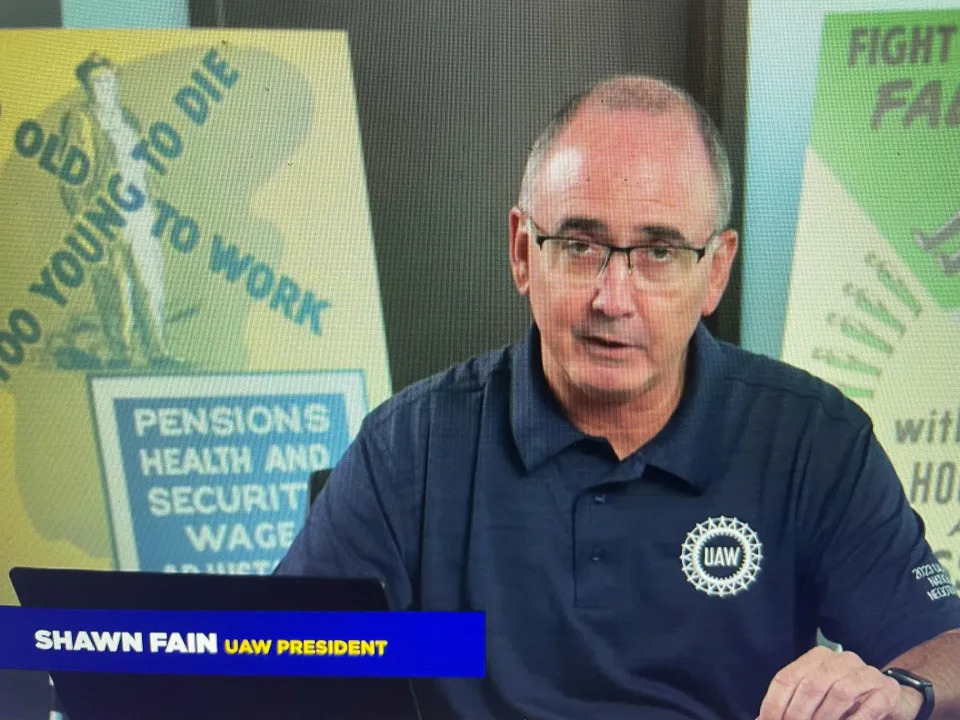
UAW Shawn Fain gives a contract update to workers via a Facebook and YouTube live presentation on Aug. 31, 2023.
"Ford’s proposal not only fails to meet our needs, it insults our very worth," Fain said. "As of today, the company’s on track to reward shareholders, on our hard work, with a whopping 150% increase in dividends. We will not accept anything less than consistent living wages that will grow with the economy.”
The news prompted Ford CEO Jim Farley to issue a lengthy rebuttal detailing the proposal Ford made and calling it, a "generous offer" that still protects the financial future of the company.
Sept. 14 'a deadline, not a reference point'
Fain gave the UAW's demands to the Detroit carmakers four weeks ago and told them he expected a response by this week, he said.
"I’ve told them repeatedly that Sept. 14 is a deadline not a reference point," Fain said, referring to the current contract's expiration at 11:59 p.m. that day and his promise he would not seek an extension.
"I am sad to report the Big Three are either not listening or not taking us serious," Fain said. "Their top leadership has ditched bargaining and refused to do the work to get a fair contract. So today our union filed unfair labor charges against GM and Stellantis with the NLRB (National Labor Relations Board)."
In a statement, Stellantis spokesperson Jodi Tinson said the company had not received the filing, but "is shocked by Mr. Fain’s claims that we have not bargained in good faith. … This is a claim with no basis in fact, and we are disappointed to learn that Mr. Fain is more focused on filing frivolous legal charges than on actual bargaining. We will vigorously defend this charge when the time comes, but right now we are more focused on continuing to bargain in good faith for a new agreement. We will not allow Mr. Fain’s tactics to distract us from that important work to secure the future for our employees."
GM indicated it was equally taken off guard by the union filing charges.
“We are surprised by and strongly refute the NLRB charge filed by the International UAW,” Gerald Johnson, executive vice president of Global Manufacturing, said in a statement. “We believe it has no merit and is an insult to the bargaining committees. We have been hyper-focused on negotiating directly and in good faith with the UAW and are making progress. The pace of negotiations is based on how quickly both parties resolve nearly 1,000 UAW demands, including more than 90 presented this week. Our goal remains the same — to achieve an agreement without a disruption that rewards our team members and protects the future of the entire GM team.”
Ford's proposal fails
Fain said he met with Ford leaders on Tuesday and the company gave him the counterproposal. He reminded viewers that Ford made $10.4 billion in profits last year and is on track to surpass that this year.
Fain said:
Ford rejected the union's proposal to end tier wages.
Ford rejected all of the UAW's job security proposals.
The UAW proposed an enhanced profit-sharing formula of $2 for every million Ford spends on stock buybacks. Ford countered with a formula that would pay workers 21% less than the current formula, he said.
Ford rejected all demands to increase retiree pay, he said.
Ford has rejected the union's quality of life proposals, including a 32-hour workweek or allowing members to have Juneteenth as a holiday.
Ford's response
In a statement, Ford CEO Farley said the automaker has exceeded its commitments to add union jobs and invest in facilities over the last three contracts. He said the 9% hourly wage increase is the largest since the 1999 contract and most of it would take effect in the first year, with 6% lump sum rewards.
That means wages (including overtime) and lump sum bonuses for hourly workers would increase from an average of $78,000 a year in 2022 to $92,000 in the first year of the contract.
"After extensive negotiations, Ford has presented a generous offer on the upcoming contract that would provide our hourly employees with 15% guaranteed combined wage increases and lump sums, and improved benefits over the life of the contract," Farley said.
On top of $92,000 annually in wages and bonuses, workers would receive health care coverage worth $17,500 and other benefits worth an additional $20,500 in the first year. Full-time permanent Ford employees at the top wage rate could be paid $98,000 that includes wages, cost-of-living adjustment bonus, ratification bonus, profit-sharing and overtime, in the first year of the contract, Farley said.
Farley called it an "important" deal for workers that would also give Ford the flexibility to transition to more electric vehicles.
"This offer would also allow Ford to compete, invest in new products, grow and share that future success with our employees through profit-sharing," Farley said.
He said the offer "fully eliminates wage tiers so all employees can achieve industry-leading wages."
Popular support
Fain said Wednesday a Gallup poll showed 67% of Americans approval of labor unions and three out of four support the UAW's 150,000 members in their demands with the Detroit carmakers.
The UAW, which officially started its negotiations with the Detroit carmakers in mid-July, has decided to forego naming a target company to secure a contract with and use as a pattern for the other two. On Friday, after union members voted to give leaders the OK to strike if a tentative contract agreement cannot be reached when the current contract expires, Fain said, “We’re not picking a target company. We expect all three to bargain with us and all three to be done by Sept. 14. We want contracts by Sept. 14 by all three.”
Unifor — the union that represents autoworkers in Canada — is following a more traditional route. On Tuesday, it chose Ford Motor Co. as the automaker it will negotiate a new labor contract with first.
Fain ended his presentation saying it has been a difficult week, but is still confident the union can reach a fair contract with the Detroit Three.
"We can get there, we can get there, but these companies have to buckle down and get serious," Fain said.
More: The balance GM's Barra and Ford's Farley must hit between UAW demands and EV affordability
More: Biden touts EV funding encouraging better-paying jobs with UAW strike looming
David Shepardson
Updated Thu, August 31, 2023
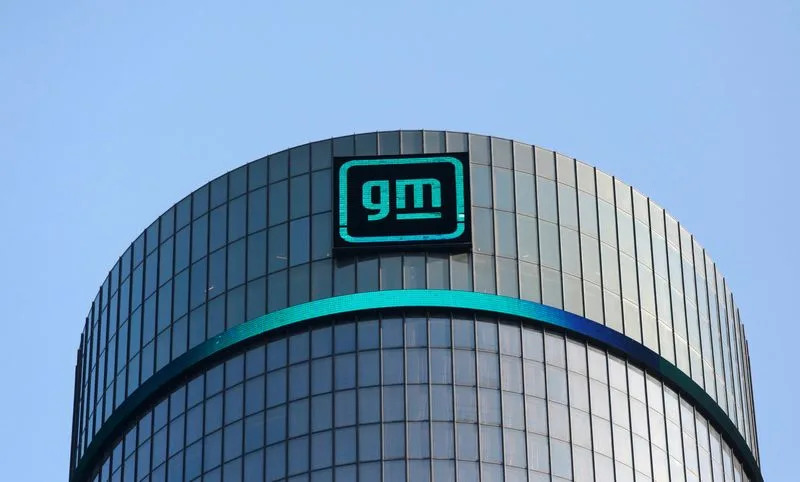
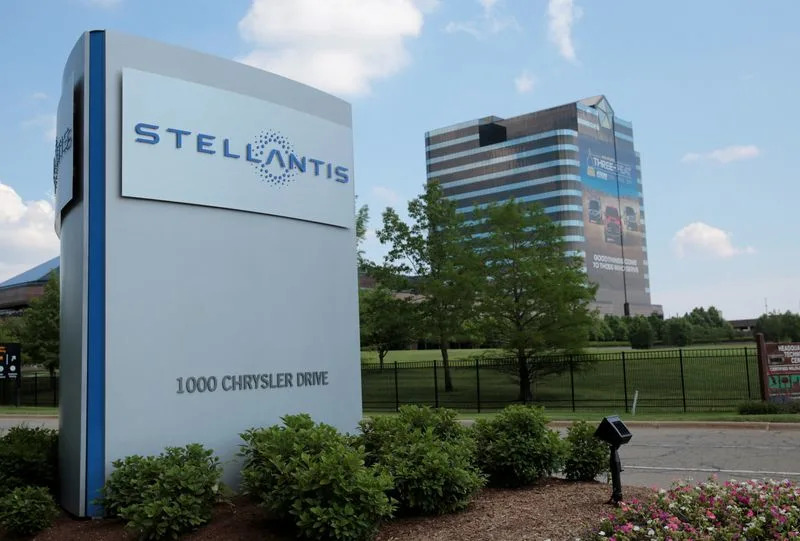

United Auto Workers President Shawn Fain greets workers at Ford Motor Michigan Assembly Plant
By David Shepardson
(Reuters) -The United Auto Workers union said on Thursday it filed unfair labor practice charges with the National Labor Relations Board against General Motors and Chrysler-parent Stellantis, saying they have refused to bargain in good faith.
Both GM and Stellantis denied the unfair labor charges.
Ford Motor said it offered a 9% wage increase through 2027, much less than the 46% wage hike being sought by the union.
Both charges seen by Reuters say the automakers over the last six months refused to bargain in good faith over wages and benefits
UAW President Shawn Fain said in online remarks that the sides are far apart.
"We're going to fight like hell to get our equitable share of justice for workers," he said. "We can get there - but these companies better buckle down and they better get serious."
Fain said the Detroit automakers want the ability to close U.S. auto plants and move them to low-wage countries, adding that threats by the automakers to close U.S. plants are "economic terrorism."
Ford said its "generous offer" would provide hourly employees with 15% guaranteed combined wage increases and lump sums, and improved benefits.
"Overall, this offer is significantly better than what we estimate workers earn at Tesla and foreign automakers operating in the U.S.," Ford said.
The union's demands include a 20% immediate wage increase, defined-benefit pensions for all workers, shorter work weeks and additional cost of living hikes.
The current four-year labor agreements covering 146,000 workers at the Detroit Three automakers expire on Sept. 14.
Fain said neither GM nor Stellantis have made counter offers.
Stellantis said it was shocked by the UAW claims "that we have not bargained in good faith. This is a claim with no basis in fact." Stellantis also said it was disappointed that Fain "is more focused on filing frivolous legal charges than on actual bargaining."
GM manufacturing chief Gerald Johnson said the company strongly refuted the unfair labor charge. "We believe it has no merit and is an insult to the bargaining committees. We have been hyper-focused on negotiating directly and in good faith with the UAW and are making progress," Johnson said.
Last week, the UAW said about 97% of members voted in favor of authorizing a strike if agreement is not reached by Sept. 14.
The UAW also wants all temporary workers at U.S. automakers to be made permanent, enhanced profit sharing, substantial increase in paid time off, and the restoration of retiree health-care benefits and cost-of-living adjustments.
The UAW said Ford wants no cap on temporary workers and that those workers would not participate in profit sharing, would earn less than 60% of the top wage rate for permanent workers and receive inferior health-care benefits.
Ford said it would boost starting pay for temporary workers to $20 an hour, up 20%, and offer permanent employees $12,000 in cost-of-living adjustments over the contract.
Ford said only 2-3% of Ford’s hourly workforce are temporary employees, the lowest among the Detroit Three.
The UAW said Ford's profit-sharing formula change would have cut payouts by 21% over the last two years, while Ford said it was offering a $5,500 signing bonus upon the contract's ratification for permanent and temporary workers.
(Reporting by David Shepardson; Editing by Chris Reese and Leslie Adler)
TOM KRISHER
Thu, August 31, 2023
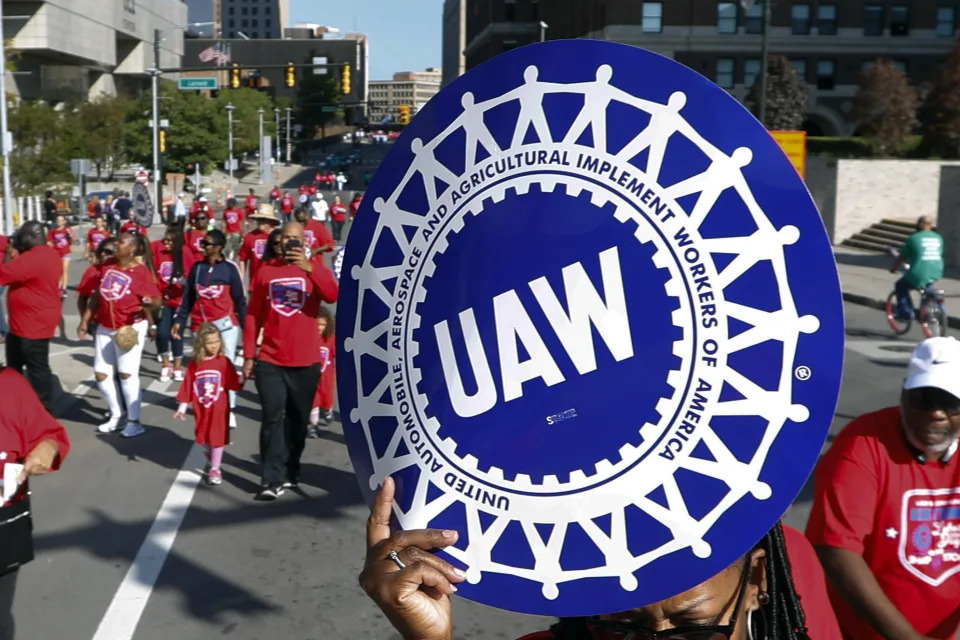
FILE - United Auto Workers members walk in the Labor Day parade in Detroit, Sept. 2, 2019. The United Auto Workers union says it has filed unfair labor practice complaints against Stellantis and General Motors for failing to make counteroffers to the union's economic demands. Ford was the only company of the Detroit Three automakers to make such an offer, but it rejected most of the union's proposals, President Shawn Fain told workers Thursday, Aug. 31, 2023, in a Facebook Live meeting.
DETROIT (AP) — The United Auto Workers union says it has filed unfair labor practice complaints against Stellantis and General Motors for failing to make counteroffers to the union's economic demands.
Ford was the only company of the Detroit Three to make a counteroffer, but it rejected most of the union's proposals, President Shawn Fain told workers Thursday in a Facebook Live meeting.
Fain's statements and strong responses from the companies showed both sides appear to be digging in with just two weeks before contracts with the union's 146,000 members expire. Fain is once again threatening to strike when the pacts end at 11:59 p.m. Sept. 14.
He told members that the companies have been warned not to wait until the last minute to get serious about bargaining.
“The Big Three are either not listening or they are not taking us seriously,” Fain said, calling the refusal to respond “insulting and counterproductive,” and also illegal. He said the union filed the complaints with the National Labor Relations Board on Thursday.
In a statement, Stellantis said the unfair labor charges are not based on fact, and that it will vigorously defend itself against them.
“We are disappointed to learn that Mr. Fain is more focused on filing frivolous legal charges than on actual bargaining,” the statement said. “We will not allow Mr. Fain’s tactics to distract us from that important work to secure the future for our employees.”
Ford said it made a fair economic proposal that is better than the pay at Tesla or foreign automakers.
“We will not make a deal that endangers our ability to invest, grow and share profits with our employees,” CEO Jim Farley said in a statement. “That would mortgage our future and would be harmful to everyone with a stake in Ford.”
GM said it strongly refutes the union's labor accusation.
“We believe it has no merit and is an insult to the bargaining committees,” GM said in a statement. “We have been hyper-focused on negotiating directly and in good faith with the UAW and are making progress.”
Automakers have said they're facing an uncertain transition from gas-powered vehicles to those that run on batteries. They're also reluctant to take on labor costs that grow even farther beyond those at Tesla and foreign automakers with U.S. factories.
Fain, who won the UAW’s presidency this spring in its first direct election of officers by members, has set expectations high, telling workers that they can make significant gains if they’re willing to walk picket lines.
But even he has described union demands as audacious. Union members are seeking 46% pay raises over four years, restoration of traditional defined-benefit pensions for new hires, an end to tiers of wages, pension increases for retirees, and a 32-hour work week for 40 hours of pay.
Top-scale assembly plant workers now make $32 per hour, but the union's proposal would raise that to $47.
Ford offered a 9% general wage increase over the life of the four-year contract, with lump sum payments instead of the union’s proposed cost-of-living adjustments, Fain said. The company also rejected demands to end tiers of wages, instead proposing that it take six years for new hires to reach the top of the pay scale rather than the current eight, he said.
Ford also turned down union demands to increase pension payments to retirees and for companies to pay workers if their plants are closed, Fain said. And it still plans to move battery work to what Fain called low-paying jobs outside of Ford at joint venture battery plants.
“Our union isn't going to stand by while they replace oil barons with battery barons,” Fain said.
Ford said offered to end wage tiers and said its proposal would give workers 15% guaranteed wage increases and lump sums, and improved benefits during the four-year contract. It said wages, including overtime and lump sum bonuses, would rise from an average of $78,000 per year last year to $92,000 in the first year of a new contract.
Workers would get $5,500 in ratification bonuses and $12,000 in cost-of-living payments during the contract, Ford said.
In addition, workers would get health care coverage worth $17,500 and other benefits worth another $20,500, the company said.
Fain has said the union could strike all three automakers at once, or it could pick a target company. Earlier this week, Canadian auto workers, whose contracts expire four days after the UAW's, selected Ford as their target.
Union alleges GM, Stellantis not bargaining in good faith
Chris Isidore, CNN
Thu, August 31, 2023
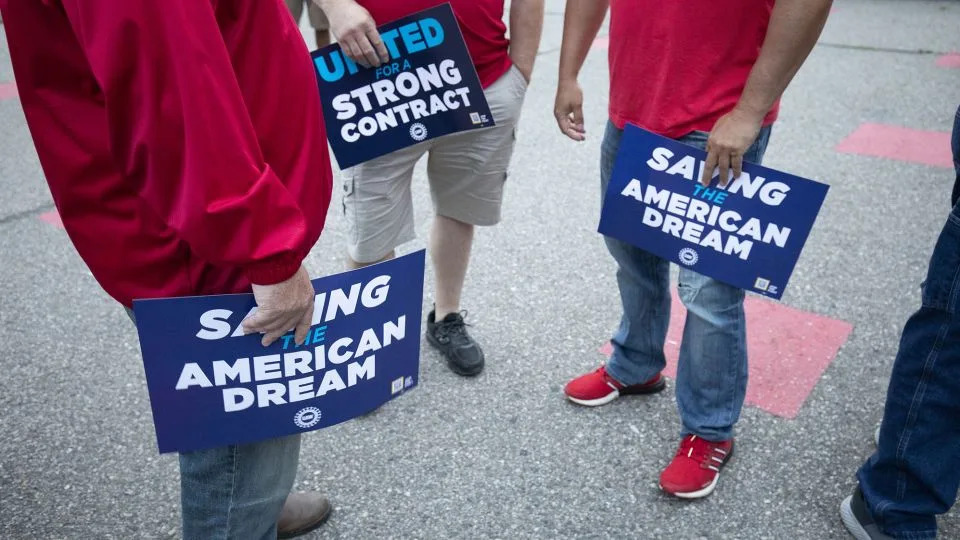
Bill Pugliano/Getty Images
United Auto Workers union President Shawn Fain said Thursday the union has filed an unfair labor practice complaint against General Motors and Stellantis, a new sign of how far apart the union and the automakers remain as they negotiate a new contract only two weeks before a strike deadline.
The complaint accuses the automakers of not bargaining in good faith by not providing any response to the union’s economic demands at the bargaining table.
“We are now 14 days out from our contract expiration and both General Motors and Stellantis have failed to give us any economic counters,” Fain said in prepared remarks obtained by CNN to members on Facebook and YouTube Thursday evening.
The complaint itself has almost no legal significance at this point because it will likely take weeks, if not months, for the National Labor Relations Board to act.
The claims are more of a negotiating tactic than a legal maneuver, said Todd Vachon, professor of labor studies at Rutgers University.
“It shows there’s definitely a lot of stress and tension between the two sides that there are unfair labor practice charges being filed at this point,” said Vachon. “It’s also a way to get members fired up.”
Fain acknowledged that the unfair labor practice is not nearly as significant a step by the union as its threat to strike.
“At the end of the day our strongest line of defense is each other and our abilility to take collective action,” he said.
Both GM and Stellantis, which makes vehicles under the Jeep, Ram, Dodge and Chrysler brands, deny the union’s charge that they are not bargaining in good faith.
“Stellantis has not received the filing, but is shocked by Mr. Fain’s claims,” said the company’s statement. “We are disappointed to learn that Mr. Fain is more focused on filing frivolous legal charges than on actual bargaining.”
Gerald Johnson, GM executive vice president of global manufacturing, said in a statement that GM was “surprised by and strongly refute the NLRB charge filed by the UAW.”
“We believe it has no merit and is an insult to the bargaining committees,” Johnson said. “We have been hyper-focused on negotiating directly and in good faith with the UAW and are making progress. The pace of negotiations is based on how quickly both parties resolve nearly 1,000 UAW demands, including more than 90 presented this week. Our goal remains the same - to achieve an agreement without a disruption.”
Fain said the automakers’ playbook in negotiations is “delay, delay, delay.”
“I still believe it’s possible to reach a deal before the deadline but only if both parties show up ready to bargain,” he said.
The UAW is on record with an ambitious set of bargaining demands, including raises of more than 40% over the four-year life of the next contract and the elimination of differences in pay and benefits between long-time employees hired before 2007, and those hired after.
Among those differences are a traditional defined benefit pension plan and retiree health care coverage that long-time employees currently have but that newer employees do not.
The union also objects to the even lower pay levels for workers who can remain stuck on temporary status for years. And it wants a return of the cost-of-living adjustment that raises pay an additional amount annually based on the rate of inflation.
Fain said that Ford is the only one of the three companies to respond to the union’s economic demands. That is why the union did not file an unfair labor practice against it. But he said the Ford offer was not sufficient, offering only a 9% raise in pay over the four-year life of the contract.
“Ford’s wage proposal not only fails to meet our needs, it insults our very worth,” he said.
Ford said its offer is better than how Fain characterized it in his remarks to members Thursday. It said that between raises in hourly wages and annual bonuses beyond any profit sharing payments, Ford’s UAW members would see guaranteed annual earnings increase by 15% over the life of the contract. It said it would pay workers far more than employees at the nonunion US auto plants operated by Tesla and foreign automakers.
“This would be an important deal for our workers, and it would allow for the continuation of Ford’s unique position as the most American automaker,” said Ford’s statement. “But we will not make a deal that endangers our ability to invest, grow and share profits with our employees. That would be harmful to everyone with a stake in Ford, including our valued UAW workers.”
The UAW’s contracts with GM, Stellantis and Ford all end at 11:59 pm on September 14, and the union has said it will not extend the contracts and stay on the job if tentative labor ageeements are not reached. There are 145,000 UAW members at the nation’s three unionized automakers. The rank-and-file members voted overwhelmingly to authorize a strike in a vote concluded August 24.
The UAW has never struck all three automakers at the same time. But UAW President Shawn Fain, who was elected earlier this year in the first popular election held to select the union’s leader, is raising the possibility this time, saying there will be no extensions granted to any of the automakers.
No comments:
Post a Comment